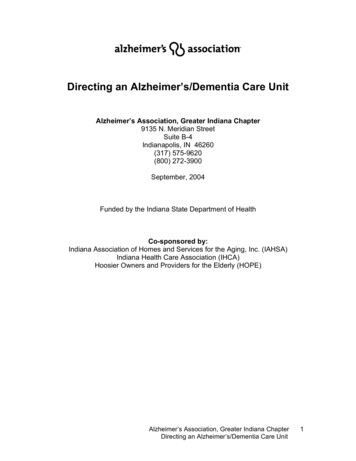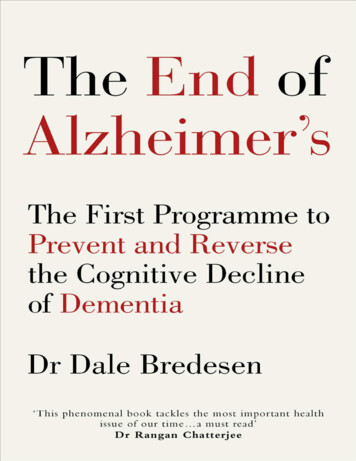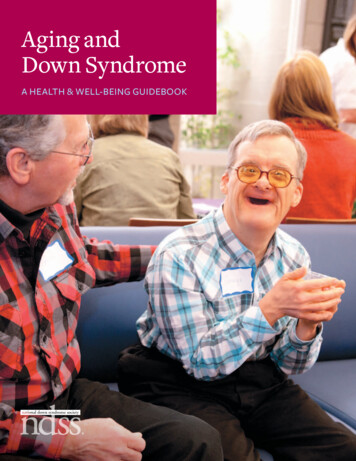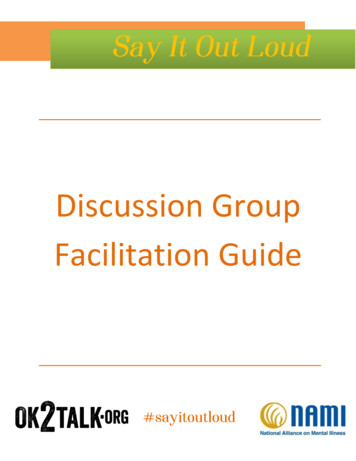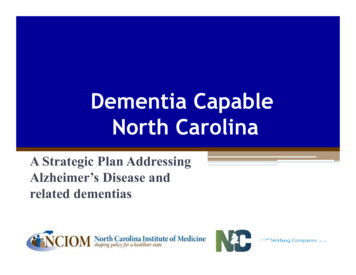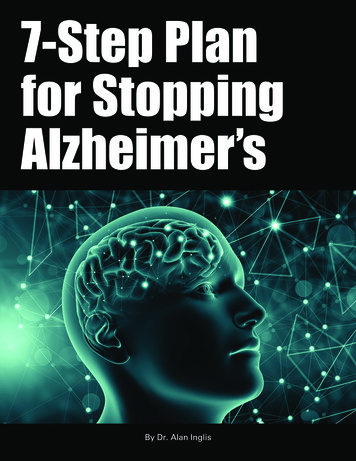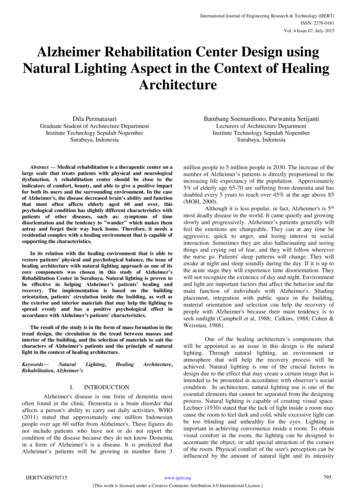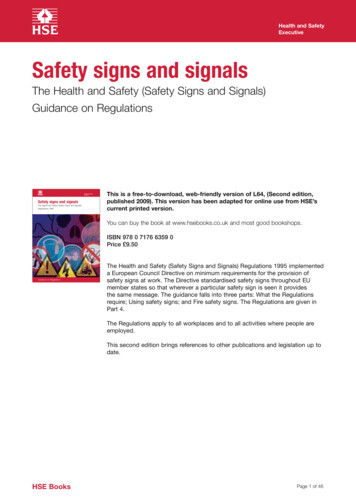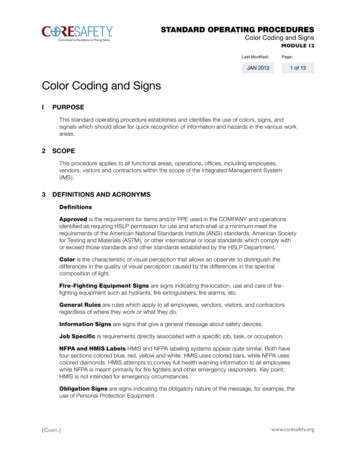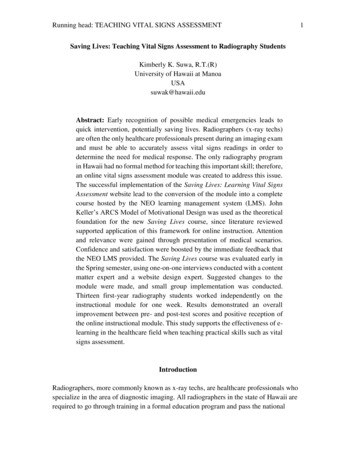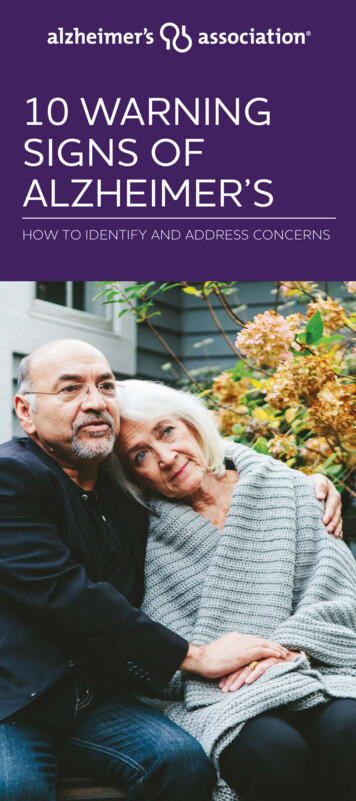
Transcription
10 WARNINGSIGNS OFALZHEIMER’SHOW TO IDENTIFY AND ADDRESS CONCERNS
2
Currently, an estimated 50 million people worldwideare living with dementia, including more than 5 millionAmericans. In collaboration with experts in the field,the Alzheimer’s Association created a list of warningsigns to help people identify symptoms that may berelated to Alzheimer’s or another dementia.CONTENTS1. Understanding Alzheimer’sand dementia . p.22. 10 Warning Signs of Alzheimer’s . p.33. What to do if you notice a sign . p.811
1.UNDERSTANDINGALZHEIMER’SAND DEMENTIAIt’s common to experience some issues with memory,thinking and behavior as we age. However, changesthat interfere with daily life could be a sign of somethingmore serious, such as dementia.Dementia is the umbrella term for a person’s declinein memory and other cognitive abilities that is severeenough to interfere with daily life. It is not a normalpart of aging. The most common cause of dementiais Alzheimer’s (AHLZ-high-merz), a progressive braindisease that results in the loss of brain cells and function.2
2.10 WARNING SIGNSOF ALZHEIMER’S1MEMORY LOSSTHAT DISRUPTSDAILY LIFE2CHALLENGESIN PLANNINGOR SOLVINGPROBLEMS3DIFFICULTYCOMPLETINGFAMILIAR TASKS4CONFUSIONWITH TIMEOR PLACE5TROUBLEUNDERSTANDINGVISUAL IMAGESAND SPATIALRELATIONSHIPS6NEW PROBLEMSWITH WORDSIN SPEAKINGOR WRITING7MISPLACINGTHINGS ANDLOSING THEABILITY TORETRACE STEPS8DECREASEDOR POORJUDGMENT9WITHDRAWALFROM WORKOR SOCIALACTIVITIES10CHANGES INMOOD ORPERSONALITY3
1 MEMORY LOSS THATDISRUPTS DAILY LIFEOne of the most common signs of Alzheimer’s disease,especially in the early stage, is forgetting recentlylearned information. Others include forgetting importantdates or events, asking the same questions repeatedly,and increasingly needing to rely on memory aids (e.g.,reminder notes or electronic devices) or family membersfor things the person used to handle on their own.What’s a typical age-related change?Sometimes forgetting names or appointments, butremembering them later.2CHALLENGES IN PLANNINGOR SOLVING PROBLEMSSome people living with dementia may experiencechanges in their ability to develop and follow a plan orwork with numbers. They may have trouble followinga familiar recipe or keeping track of monthly bills.They may have difficulty concentrating and take muchlonger to do things than they did before.What’s a typical age-related change?Making occasional errors when managing financesor household bills.NOTE: It’s possible for individuals to experienceone or more of these signs in varying degrees.It is not necessary to experience every sign inorder to raise concern.4
3DIFFICULTY COMPLETINGFAMILIAR TASKSPeople living with Alzheimer’s disease often find ithard to complete routine tasks. Sometimes theymay have trouble driving to a familiar location,organizing a grocery list or remembering the rulesof a favorite game.What’s a typical age-related change?Occasionally needing help to use microwave settingsor to record a TV show.4CONFUSION WITH TIME OR PLACEPeople living with Alzheimer’s can lose track of dates,seasons and the passage of time. They may havetrouble understanding something if it is not happeningimmediately. Sometimes they may forget where theyare or how they got there.What’s a typical age-related change?Getting confused about the day of the week, butfiguring it out later.5TROUBLE UNDERSTANDINGVISUAL IMAGES AND SPATIALRELATIONSHIPSFor some people, vision problems are a sign of Alzheimer’s.This may lead to difficulty with balance or trouble reading.They may also have problems judging distance anddetermining color or contrast, causing issues with driving.What’s a typical age-related change?Vision changes related to cataracts.6NEW PROBLEMS WITH WORDSIN SPEAKING OR WRITINGPeople living with Alzheimer’s may have troublefollowing or joining a conversation. They may stopin the middle of a conversation and have no ideahow to continue, or repeat themselves. They maystruggle with vocabulary, have trouble naming afamiliar object or use the wrong name.What’s a typical age-related change?Sometimes having trouble finding the right word.5
7MISPLACING THINGS AND LOSINGTHE ABILITY TO RETRACE STEPSA person living with Alzheimer’s may put things inunusual places. They may lose things and be unableto go back over their steps to find them again. He orshe may accuse others of stealing, especially as thedisease progresses.What’s a typical age-related change?Misplacing things from time to time and retracingsteps to find them.8DECREASED OR POOR JUDGMENTIndividuals may experience changes in judgment ordecision-making. For example, they may use poorjudgment when dealing with money or pay lessattention to grooming or keeping themselves clean.What’s a typical age-related change?Making a bad decision or mistake once in a while,like neglecting to change the oil in the car.6
9WITHDRAWAL FROM WORKOR SOCIAL ACTIVITIESA person living with Alzheimer’s disease may experiencechanges in the ability to hold or follow a conversation.As a result, he or she may withdraw from hobbies, socialactivities or other engagements. They may have troublekeeping up with a favorite team or activity.What’s a typical age-related change?Sometimes feeling uninterested in family or socialobligations.10CHANGES IN MOODAND PERSONALITYIndividuals living with Alzheimer’s may experience moodand personality changes. They can become confused,suspicious, depressed, fearful or anxious. They may beeasily upset at home, with friends or when out of theircomfort zone.What’s a typical age-related change?Developing very specific ways of doing things andbecoming irritable when a routine is disrupted.WHAT’S THE DIFFERENCE?Warning signs ofAlzheimer’s /dementiaTypicalage-related changesPoor judgment anddecision-makingMaking a bad decision oncein a whileInability to managea budgetMissing a monthly paymentLosing track of the dateor the seasonForgetting which day it isand remembering laterDifficulty having aconversationSometimes forgettingwhich word to useMisplacing things and beingunable to retrace steps tofind themLosing things fromtime to time7
3.WHAT TO DO IFYOU NOTICE A SIGNIf you notice one or more signs in yourself or anotherperson, it can be difficult to know what to do. It’s naturalto feel uncertain or nervous about discussing thesechanges with others. Voicing worries about your ownhealth might make them seem more “real.” Or, you mayfear upsetting someone by sharing observations aboutchanges in his or her abilities or behavior.However, these are significant health concerns thatshould be evaluated by a doctor, and it’s important totake action to figure out what’s going on.Have a conversationIf you’ve noticed any of the signs in yourself, confidein someone you trust. Similarly, if you’ve noticedmemory changes in someone else, think about whowould be best to approach the person, whether it’syou or another trusted family member or friend. Havethe conversation as soon as possible in a location thatwill be comfortable for everyone involved.Visit alz.org/memoryconcerns for tips onapproaching memory concerns.8
See a doctorMultiple conditions can cause cognitive changes,so it’s essential to obtain a full medical evaluationto determine whether symptoms are related toAlzheimer’s or something else. If the cause is notAlzheimer’s or another dementia, it could be a treatablecondition. If it is dementia, there are many benefitsto receiving an early and accurate diagnosis, includingan opportunity to plan for the future, access supportservices and explore medication that may address somesymptoms for a time.To learn more about the diagnostic process, visitalz.org/evaluatememory.9
alz.org/10signsLearn more about the 10 Warning Signs ofAlzheimer’s.alz.org/CRFWe’re in communities nationwide.800.272.390024/7 Helpline – Available all day, every day.The Alzheimer’s Association is the leading voluntaryhealth organization in Alzheimer’s care, supportand research. Our mission is to eliminate Alzheimer’sdisease through the advancement of research; to provideand enhance care and support for all affected; andto reduce the risk of dementia through thepromotion of brain health.Our vision is a world without Alzheimer’s disease .800.272.3900 alz.org This is an official publication of the Alzheimer’s Association but may be distributedfreely and without charge by unaffiliated organizations and individuals. Suchdistribution does not constitute an endorsement of these parties or their activitiesby the Alzheimer’s Association. 2019 Alzheimer’s Association . All rights reserved.10Rev.Jun19773-10-0002
3 2. 10 warning signs of alzheimer's 1 memory loss that disrupts daily life challenges in planning or solving problems difficulty completing familiar tasks confusion with time
